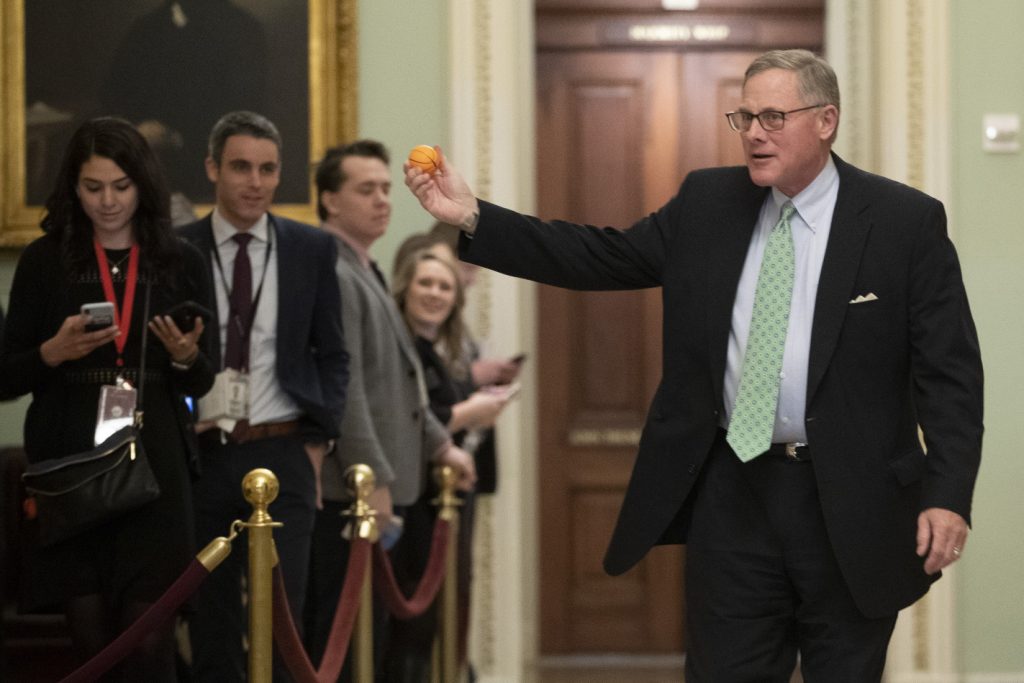Weeks Before Virus Panic, Intelligence Chairman Privately Raised Alarm, Sold Stocks

DAVID GREENE, HOST:
NPR has obtained a secret recording taken three weeks ago. You’re going to hear the voice of Senate Intelligence Committee Chairman Richard Burr, Republican in the Senate. You’re going to hear him warning a private audience about how the coronavirus would impact the United States.
(SOUNDBITE OF ARCHIVED RECORDING)
RICHARD BURR: There is one thing that I can tell you about this. It is much more aggressive in its transition than anything we have seen in recent history. It’s probably more akin to the 1918 pandemic.
GREENE: More akin to the 1918 pandemic is what you heard him say there. This was a stronger message than most Americans were hearing at that time. And Burr’s comments raise questions about why an audience at a lunch on Capitol Hill would get what seemed to be a more frank assessment than the general public. NPR’s Tim Mak is the one who got his hands on this recording and is with us this morning. Hi, Tim.
TIM MAK, BYLINE: Hey there.
GREENE: OK, so who was the senator speaking to in this clip, and where’d the tape come from?
BURR: Well, the luncheon was organized by the Tar Heel Circle, which consists of businesses and organizations from North Carolina, the state that Senator Burr represents. Membership in the Tar Heel Circle costs between $500 and $10,000. Burr was talking candidly about his assessment of how – about how bad the coronavirus might become in the U.S., and the tape comes from an attendee who became alarmed about Burr’s dire warnings, so began to record.
GREENE: Oh, so worried and saying, this sounds like very serious stuff. I better start recording this. What else did the senator say in this meeting?
MAK: Well, Senator Burr warned well in advance that the coronavirus could be very disruptive. A lot of the things he warned about have actually come to pass. You know, 13 days before the State Department began to warn against travel to Europe and 15 days before the Trump administration banned European travelers from the U.S., Burr warned those in that room to reconsider.
(SOUNDBITE OF ARCHIVED RECORDING)
BURR: Every company should be cognizant of the fact that you may have to alter your travel. You may have to look at your employees and judge whether the trip they’re making to Europe is essential or whether it can be done on video conference. Why risk it?
MAK: Sixteen days before North Carolina closed its schools due to the threat of coronavirus, Burr warned it could happen. It is only now, three weeks later, that the public is learning in earnest about how the military may be mobilized to combat the coronavirus. But Burr invoked the prospect when talking about how the country might have to surge its medical capacity.
GREENE: Well, Tim, I want to be really careful about the timing here. So all of those warnings were Burr’s message behind closed doors. What was he saying publicly at that same time?
MAK: Nowhere in press statements or other remarks did Senator Burr provide warnings about how bad he worried the coronavirus crisis would become. I think what’s interesting about this story is that Burr was providing a stark assessment about coronavirus to a small audience of constituents, which, as an elected official, he never told the general public about.
This story raises questions about whether Burr was truly frank with the public about how bad the coming might – the coming weeks might be, in his opinion. Remember, his comments at the luncheon contradicted the president’s then-rosy outlooks. That same day, here’s what the president said about the coronavirus.
(SOUNDBITE OF ARCHIVED RECORDING)
PRESIDENT DONALD TRUMP: It’s going to disappear one day. It’s like a miracle. It will disappear. And from our shores, we – you know, it could get worse before it gets better. Could maybe go away. We’ll see what happens.
GREENE: Well, I mean, we’ve certainly seen President Trump’s level of concern change dramatically in the last couple of weeks since then. In terms of Senator Burr, like, what is his history working on, you know, health issues like this?
MAK: Well, he has a long history. In fact, he’s a major author of the legislative framework for how the United States deals with pandemics. But despite his work, his decades of work on biohazards and his position as a lawmaker and chairman on the Senate Intelligence Committee, he didn’t speak out about his assessment. It’s hard to know whether, had he done so, anything would have been different. But according to a public health expert I spoke to, warning the public about the extreme measures that may have been coming down the line could have allowed people more time to prepare.
GREENE: And you reached out to Senator Burr’s office for comment on all this. What are they saying?
MAK: Well, Senator Burr’s spokesperson stressed that the senator has had a longtime advocacy of public health preparedness and that he has, quote, “worked to educate the public about the tools and resources our government has to confront the spread of coronavirus.” Burr’s spokesperson also said that every American should take the coronavirus threat seriously.
GREENE: All right. NPR’s Tim Mak, thanks so much for your reporting on this, Tim.
MAK: Thank you.
![]()





